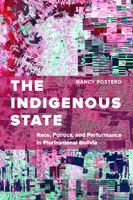The Indigenous State: Race, Politics, and Performance in Plurinational Bolivia
Abstract
In 2005, Bolivians elected their first indigenous president, Evo Morales. Ushering in a new “democratic cultural revolution,” Morales promised to overturn neoliberalism and inaugurate a new decolonized society. In this perceptive new book, Nancy Postero examines the successes and failures that have followed in the ten years since Morales’s election. While the Morales government has made many changes that have benefited Bolivia’s majority indigenous population, it has also consolidated power and reinforced extractivist development models. In the process, indigeneity has been transformed from a site of emancipatory politics to a site of liberal nationstate building. By carefully tracing the political origins and practices of decolonization among activists, government administrators, and ordinary citizens, Postero makes an important contribution to our understanding of the meaning and impact of Bolivia’s indigenous state.
Keywords
race; politics; decolonization; indigenous; evo morales; disagreement; extractivism; liberalism; bolivia; performance; Isiboro Sécure National Park and Indigenous Territory; NeoliberalismDOI
10.1525/luminos.31ISBN
9780520967304;9780520967304;9780520967304OCN
970396759Publisher
University of California PressPublisher website
https://www.ucpress.edu/Publication date and place
Oakland, California, 2017Classification
Anthropology


 Download
Download Web Shop
Web Shop